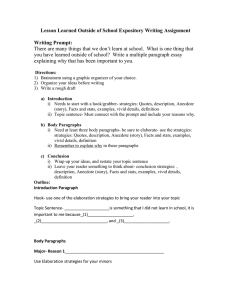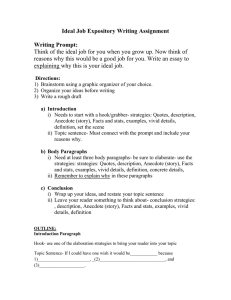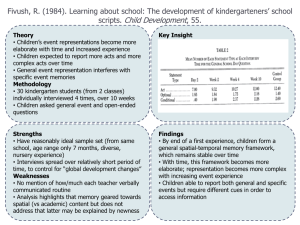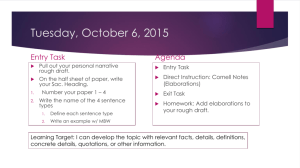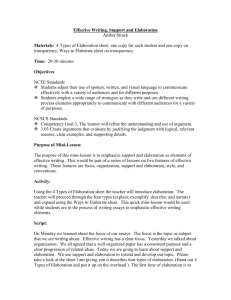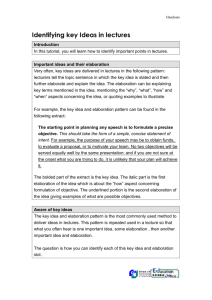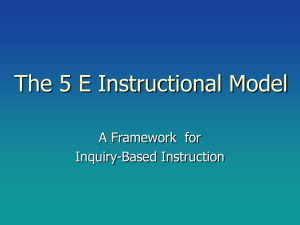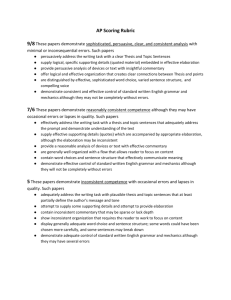3FCATWr.Final.Rev
advertisement
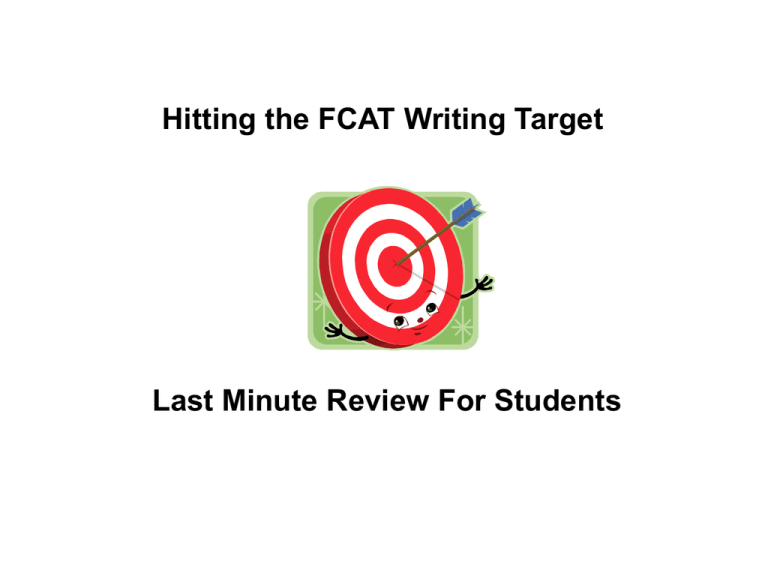
Hitting the FCAT Writing Target Last Minute Review For Students The most important part of the FCAT Writing test essay is the component of support. In order for a student to score well, the student must fully ELABORATE on two ideas. As you write, think of the reader as saying, “Tell me more!” Tell him all the details. The reader should have no more questions after reading the paragraph! Qui ckTime™ and a TIF F (Unc ompress ed) dec ompress or are needed to see t his pict ure. Now I understand Completely! What does elaboration look like? • ANECDOTES -- An anecdote is a short narrative inserted into an essay to serve as an example. An anecdote might be introduced by for instance, once, I remember one time when . . .. For instance, once when I was working as a bag boy at Publix, I . . ..” I remember one time when my English teacher said, “You absolutely should not . . ..” Develop an idea with an anecdote. Losing is no reason to quit. I remember one time when J played on the traveling softball team. Her team was losing by 6 runs, and it was the 7th inning. The other team was laughing and packing up their bats. So, J’s Coach said to her team, “They’re laughing; they think this is over.” How little that team knew because . . .. You can also elaborate by giving detailed examples. Students have way too much homework. We can’t possibly get it done. For example, just last night my geography teacher made us read a whole chapter, write out answers to the chapter questions (in complete sentences yet) and then build a volcano out of paper mache. That took hours. Another example is my English teacher who assigned half of Of Mice and Men to be read by today. And we had a horrible test on it that most students failed. What did she expect? Next, I need to tell you about my math teacher who . . .. Or you can elaborate by using a definition for a term that needs to be defined for the reader. The best thing about school is the grade forgiveness policy. What I mean is that they have this policy that allows students who fail a course to take it again for a higher grade. If the student gets a better grade when he repeats the course, he gets the second grade and the failing one is forgiven. Elaboration might include the use of statistics to help support an idea or argument. (On the FCAT, students can make up statistics!) Some parents recognize the importance of prom night, but not all. At least 94% of the seniors said they plan to stay out all night even if their parents say they have a curfew. About 35% said they would lie and say they are staying at a friend’s house overnight. The way to convince parents to support . . .. Elaboration might include the use of a quotation from someone who could be considered an expert. The right equipment is of great importance in a sport. Sometimes equipment that is not right affects how a player performs. For the 2006-07 season, the NBA switched the kind of basketball to be used in all the games. Many players hated the new ball. Dwayne Wade of the Miami Heat even said, “I really hate the new ball. When I try to hit a bank shot, . . ..” Elaboration could include description that creates a vivid picture for the reader. Knee surgery isn’t as bad as you might think. I know because I watched one. The surgeon made a tiny, quarter-inch incision on the affected knee and inserted a long thin scope (arthroscope). This scope allowed him to work directly on the joint area. The surgeon used an ice pick-like tool called an awl to drill very small holes (microfractures) into the bone near the defective cartilage. The injury prompted the body to make new, replacement cartilage. Bone marrow seeped out of the holes, creating a blood clot that released cartilage-building cells. When you elaborate, be sure to use specific, concrete words. Don’t say, “His classroom was a mess.” Instead, say, “The English classroom, Room 709, had been vandalized. Bright red paint was splattered on the blue carpet, and the light fixtures dangled by a wire. On the whiteboard was a note that threatened Mr. Smith with a beating if he reported the crime.” What you need to remember about elaboration, is that you can elaborate in many appropriate ways: • facts • ideas • reasons • examples • expert testimony • emotional appeals • logical appeals • statistics • observations • anecdotes • analysis • predictions • descriptions • Remember to write a short introduction: what is your paper going to be about. Examine the prompt carefully and take a position BEFORE you write. • When you are ready to end your paper, pretend that The reader has said to you, “So what?” • Then do a quick check on capital letters, spelling of words that are easy to misspell when you rush, subject-verb agreement, and end marks of punctuation. (Did you put a period where you should have a question mark?) KNOW THAT EVEN A 6 IS NOT A PERFECT PAPER!
